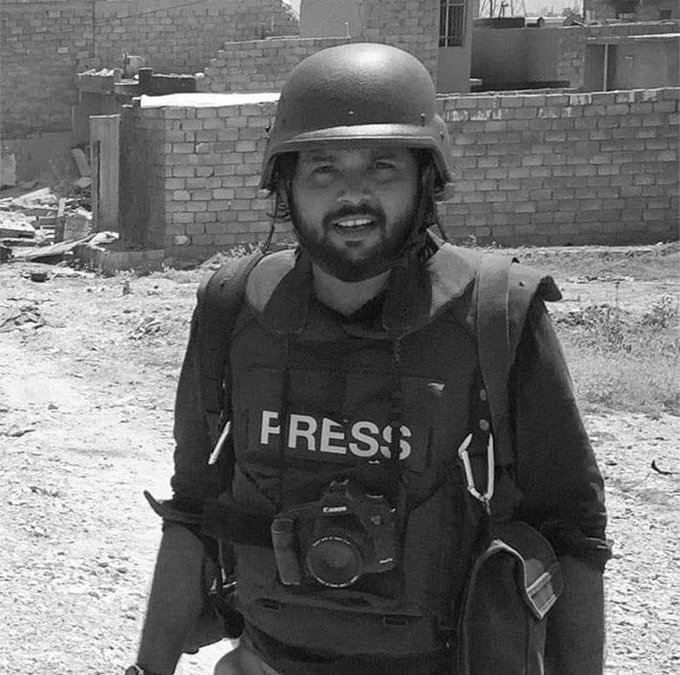
'He loved kids, was extremely emotional': Father remembers Siddiqui
Father of Danish Siddiqui, who was killed during clashes in Spin Boldak district in Afghanistan's Kandahar on July 16, remembers the passion his son had.

“He was an extremely emotional person,” said Mohammad Akhtar Siddiqui in a voice full of grief and pride as he remembered his brilliant photojournalist son, Danish Siddiqui.
Danish Siddiqui, in his early 40s, was killed during clashes in Spin Boldak district in Afghanistan’s Kandahar on Friday, Tolo News quoted sources as saying. It said fierce fighting has been going on in Kandahar, especially in Spin Boldak, for the last few days.
The Indian journalist was covering the situation in Kandahar.
“He was very calm and quiet, a very loving son. He loved children a lot. A very emotional person,” the retired Jamia professor said a day after the grim news of Danish Siddiqui’s death, something no father would want to hear in his life, reached Delhi.
Also read: Taliban ‘regrets’ Siddiqui’s death; issues an advisory for journalists
Talking about the work that required him to be in life-threatening situations, Akhtar Siddiqui said the family got used to his work life over the years.
“We used to tell him in the beginning what was the need for such a job, but we almost got used to it. He’d tell us they have security, they travel with full protection. We only told him to maintain all precautions,” he told PTI.
“All his photos clearly showed who was in power and who wasn’t. This famous photo of his doesn’t show a Muslim man being beaten up by thugs. It shows a rabid mob beating a Muslim man. What does this mean? The subject of the photo is not the man. It’s the mob,” tweeted journalist Vaishnavi Suresh in a series of tweets explaining the nuances of Siddiqui’s work.
All his photos clearly showed who was in power and who wasn't. This famous photo of his doesn't show a Muslim man being beaten up by thugs. It shows a rabid mob beating a Muslim man. What this means? The subject of the photo is not the man. It's the mob. pic.twitter.com/xgaLssuqUw
— Vaishnavi Suresh (@vaishnaviisure1) July 16, 2021
In the last one year, Danish Siddiqui extensively covered the COVID-19 pandemic across the country.
“He was a brilliant and dashing chap. He had a lot of commitment towards his work, passion to face challenges. Even during the pandemic, Delhi riots, he reported facts despite the challenges,” Mohammad Akhtar Siddiqui said.
“Passionate and energetic” as a child, Akhtar Siddiqui remembered, Danish would finish with perfection whatever he set his mind to.
“He was extraordinarily courageous,” the father said before his voice trailed off.
Danish Siddiqui’s work as a photojournalist with Reuters news agency since 2011 involved reporting on the wars in Afghanistan and Iraq, the Rohingya refugee crisis, the protest in Hong Kong and earthquakes in Nepal.
“Danish was in fact a Pulitzer Prize-winning photojournalist who’d covered some of the most brutal and dangerous conflicts globally. His photos are so beautiful and grotesque they make you hurt. Compared to him, I was nothing. But never once did he make me feel small,” tweeted journalist Karen Rao in a Twitter thread about her conversations with Siddiqui.
Danish was in fact a Pulitzer Prize-winning photojournalist who'd covered some of the most brutal and dangerous conflicts globally. His photos are so beautiful and grotesque they make you hurt. Compared to him, I was nothing. But never once did he make me feel small.
— Karen Hao 郝珂灵 (@_KarenHao) July 16, 2021
He graduated with a degree in Economics from Jamia Millia Islamia, Delhi. He had a degree in Mass Communication from the AJK MCRC in Jamia in 2007.
Starting his career as a television news correspondent, he switched to photojournalism and joined Reuters as an intern in 2010.


